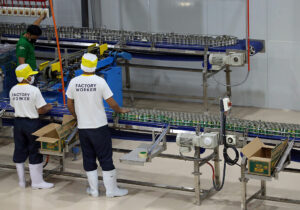Maharlika investments need to be monitored — analysts

By Luisa Maria Jacinta C. Jocson, Reporter
THE MAHARLIKA Investment Corp. (MIC) must ensure that investments made by the country’s first wealth fund would generate returns higher than investments made by existing government financial institutions, analysts said.
This as the implementing rules and regulations (IRR) allow the Maharlika Investment Fund (MIF) to make wide-ranging investments in infrastructure projects, fixed-income instruments, domestic and foreign corporate bonds, and listed or unlisted equities, among others.
“To justify the existence of the MIF, the government must prove that the returns on their investments are greater than the returns if these resources were invested in our government social investments or by our own government financial institutions,” Ateneo de Manila University economics professor Leonardo A. Lanzona said in an e-mail.
“In other words, these investments are characterized by very high opportunity costs, especially because most of the government funds are based on its borrowings. Failure to achieve high returns will only result in even greater taxes or debt for the country,” he added.
Any investments to be made by the Maharlika fund should also be carefully scrutinized to prevent the government from incurring losses and more debt.
Former Bangko Sentral ng Pilipinas (BSP) Deputy Governor Diwa C. Guinigundo said Congress has created a “strategic, super investment corporation that can do almost anything even against its own good.”
“In doing infrastructure, it does not have to put up this superbody; we have the Public Works and Highways and Transportation departments to do it as part of their duties to elevate the quality of social and economic services funded by the budget. We are in effect creating another layer of bureaucracy. This is very expensive,” he said in a text message.
Mr. Guinigundo said risks could arise from the fact that the MIC can extend loans and guarantees.
“Another exhibit of bad thinking is allowing MIC to grant loans and even provide guarantees to companies which may be described as semi-government because there are presumably private investors involved,” he said.
Under the rules, the MIC is authorized to extend “loans and guarantees to, or participation into joint ventures or consortiums with Filipino and foreign investors, whether in the majority or minority position in commercial, industrial, mining, agricultural, housing, energy, and other enterprises, which may be necessary or contributory to the economic development of the country, or important to the public interest.”
Mr. Guinigundo said this could increase contingent liabilities of the government and increase the risk to fiscal sustainability.
“Because the country has no surplus and funds will be coming from other government agencies whose budget may have to be funded by either taxes or loans, what the Maharlika is effectively doing is investing borrowed funds, lending borrowed funds or extending guarantees with borrowed funds,” he said.
“Nothing prevents politics from possibly entering business decisions here. What will prevent Maharlika from buying distressed but favored corporates? Or invest in stocks of distressed but favored corporates?”
Former BSP Governor Felipe M. Medalla said the IRR has “enough” safeguards but noted that MIC’s current structure is “much more than an asset management corporation.”
“For instance, it can ‘execute strategic initiatives that resonate with the fund’s objectives and align with the country’s economic strategies’ possibly through ‘joint venture or co-investment not prejudicial to the interest of government,’” he said in a text message.
“However, given how difficult the above task could be, it may end up as an ordinary (e.g., nonstrategic) fund management company, which has to be funded by a government that is heavily indebted,” he added.
Under the IRR, the MIC can also invest in cash, foreign currencies, metals, and other tradable commodities; fixed-income instruments issued by sovereigns, quasi-sovereigns and supranationals; domestic and foreign corporate bonds; listed or unlisted equities, whether common, preferred, or hybrids; and Islamic investments, such as Sukuk bonds.
Mr. Lanzona noted that investing in unlisted equities and foreign bonds could offer “conceptually higher growth rates and provide opportunities to engage with early stage companies with high-growth potential.”
“However, these also come with higher risks and are less liquid than listed equities. The same higher return potential is also found in foreign bonds, but they come with additional risks due to currency exchange fluctuations and geopolitical factors,” he said.
Mr. Lanzona said that the MIC board must consider not just the level of returns but the risks that can be tolerated given the wide array of investments it can invest in.
“How the MIF will bring the needed returns net of its high opportunity costs remains a fundamental question. Investing government resources that come essentially from the country’s debts is foolhardy,” he said.
The National Government’s (NG) outstanding debt reached a record P14.15 trillion as of end-June. As of end-June, the NG’s outstanding debt as a share of gross domestic product stood at 61%, slightly higher than the 60.9% seen as of end-December. This was also still above the 60% threshold considered manageable by multilateral lenders for developing economies.
Meanwhile, Regina Capital Development Corp. Head of Sales Luis A. Limlingan said the MIC board should favor a “balanced portfolio with measured risk.”
“Since I work in local equities my views are biased, however, modern portfolio theory has taught us that diversification minimizes risk and maximizes return,” he said in a Viber message.
“The external factors have been very hard to factor and discount especially when it comes to geopolitical risks. Having an experienced fund manager that has international experience would greatly be beneficial to the team,” he added.




